How Is AI Revolutionizing Market Intelligence?


Key Takeaways:
Door-to-door canvassing, public polling, focus groups—market research has always been labor-intensive and time-consuming.
Still, in the past, these methods worked because markets moved at a slower pace.
But things have changed. Drastically.
Markets move faster than ever, and customers expect you to know what they want before they even say it.
Old-school tactics just can’t keep up.
It’s time for something else, something better.
That something is AI-powered market intelligence.
Read on to discover why this technology is a true game-changer, and how it outperforms traditional methods in delivering those vital market insights.
AI algorithms can analyze vast datasets from both structured and unstructured sources with speed and precision that far exceed human capabilities.
Jennifer Moceri, Vice President of Global Procurement and CPO at Google, explains why this is such a game-changer:

Illustration: Veridion / Quote: CPOstrategy
That’s right.
With the power of AI, you’re able to detect emerging trends, track competitors, and spot shifts in consumer behavior much earlier than traditional methods allow.
Ultimately, this opens doors to faster, more agile, and better-informed decision-making as well as reduced risk.
No surprise, then, that 81% of market research companies use AI for data analysis, making it the most common AI use case according to the 2024 Cint survey.
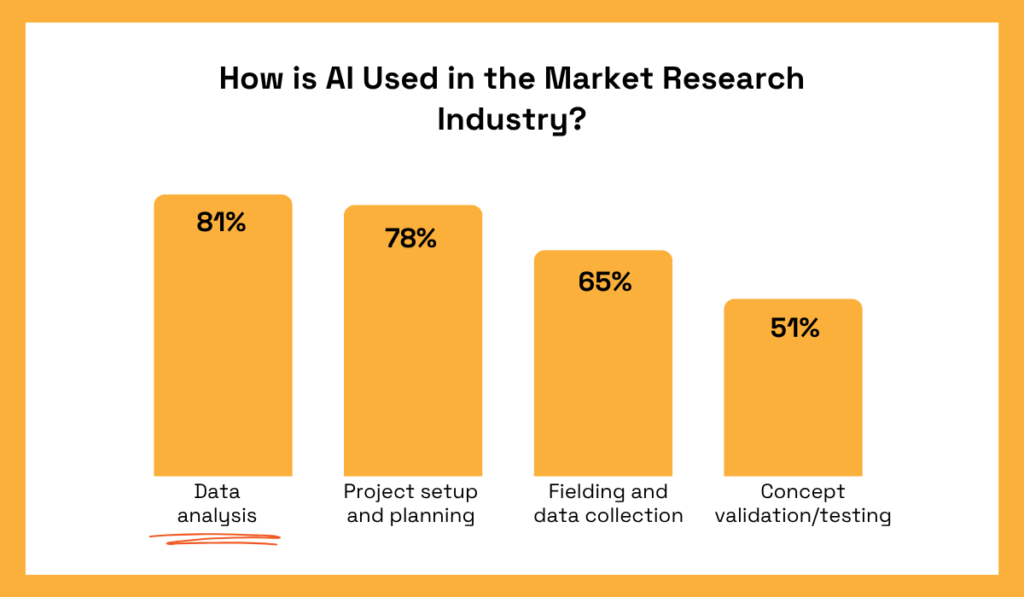
Illustration: Veridion / Data: Cint
It’s easy to see why.
Tasks that would take human analysts days, weeks, or even months, AI completes in seconds, uncovering patterns that might otherwise go unnoticed.
Take our own AI-driven market intelligence platform, Veridion.
Veridion’s proprietary aggregation engine continuously indexes and verifies data from company websites, public registries, regulatory filings, product catalogs, social profiles, and trusted news sources.
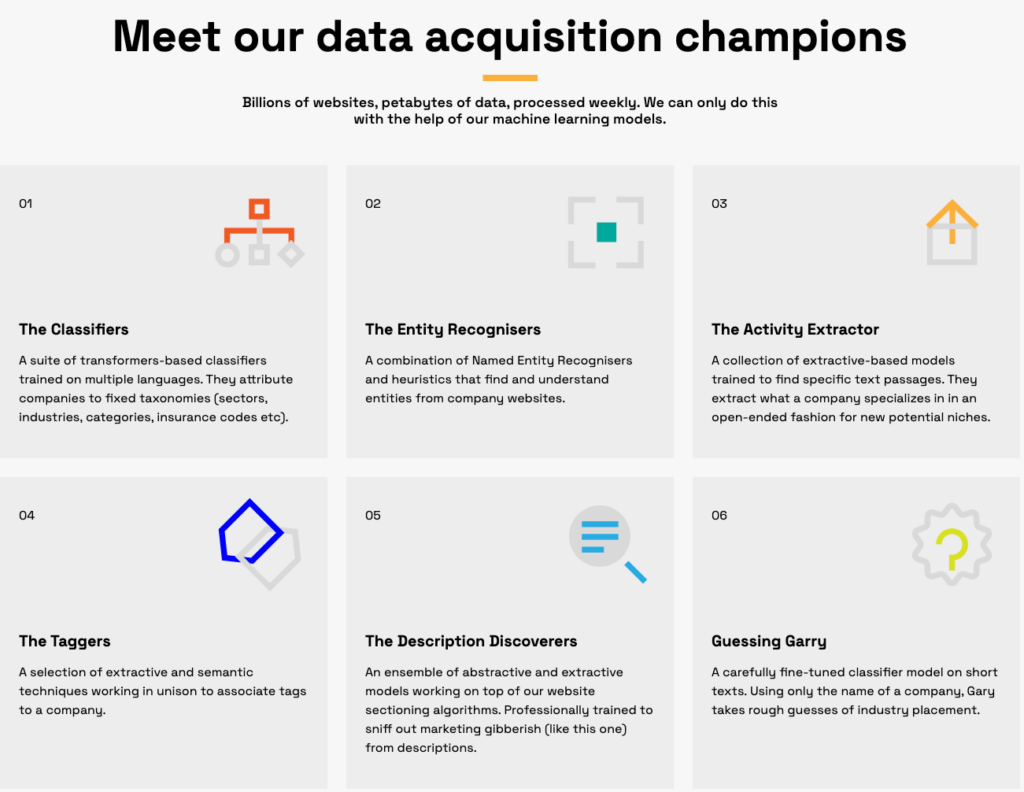
Source: Veridion
It leaves nothing behind.
And the result?
Instant access to a database of 134M+ companies worldwide, including hard-to-find SMBs and registered entities.
The data is refreshed weekly, so your decisions are always grounded in real-time, real-world business activity.
The following use cases illustrate just a few ways our structured intelligence can transform and elevate your workflows:
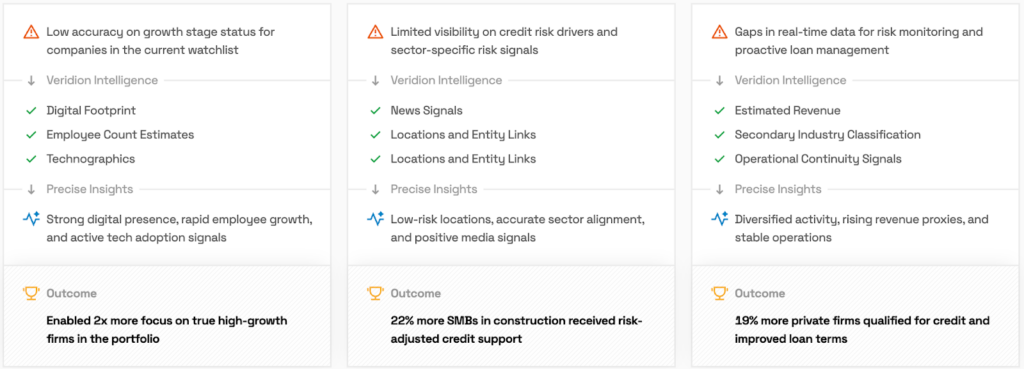
Source: Veridion
Remember, the quality of your decisions depends on the quality of your data.
This is where Veridion comes in, doing the hard part for you and delivering the most precise, up-to-date data out there.
AI doesn’t just cover more ground. It also goes deep.
It can uncover micro-trends and niche patterns by breaking data down to the smallest segments, from individual customer behaviors to regional performance levels.
As such, it helps identify non-obvious correlations that humans might miss.
Kirtan D., CEO at OperateIQ, a digital transformation agency, explains what granularity means:
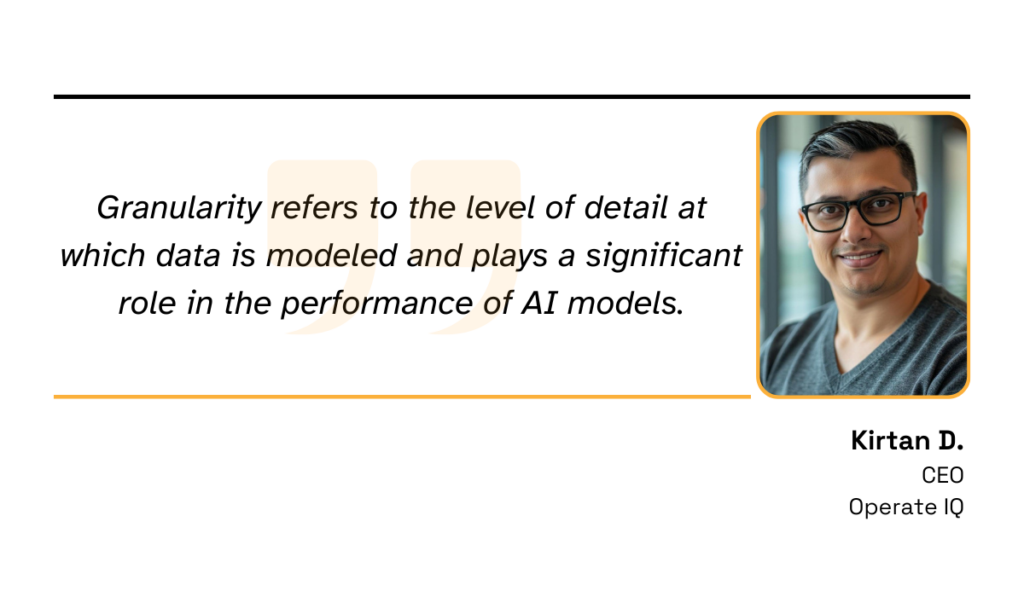
Illustration: Veridion / Quote: LinkedIn
But what does that mean in practice?
It means more context.
Instead of just telling you a company’s size or industry, AI reveals deeper contextual attributes, like ESG policies, tech stacks, compliance practices, and other insights such as:
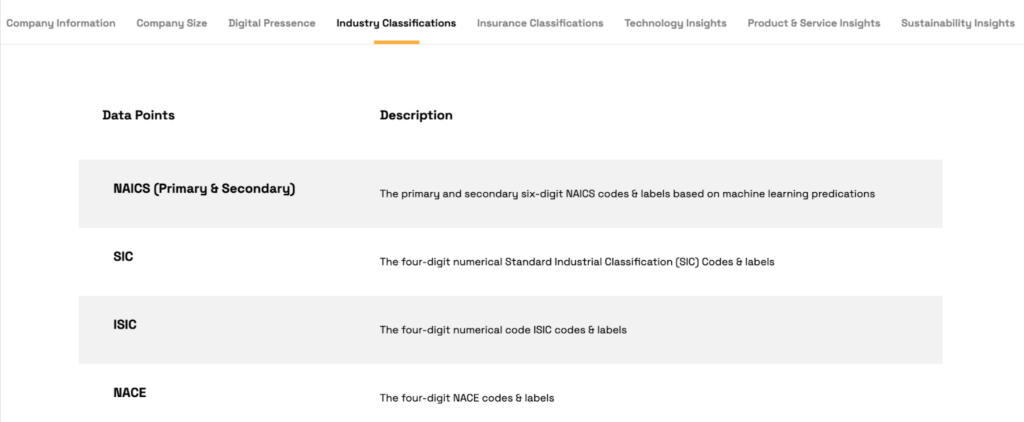
Source: Veridion
The same applies to consumer data.
Beyond basic demographics, you gain psychographics, purchase history, location, income level, interests, and other fine-grained details.
So, for example, instead of simply knowing sales dropped, AI could pinpoint that millennial women in suburban areas stopped buying because of rising prices.
That level of insight changes the game.
It lets you personalize offerings, optimize supply chains, and localize marketing strategies with precision.
Imagine you’re planning on expanding into the global market.
Before making any major decisions, you’d need to understand local market dynamics.
Fabrice Testa, Co-Founder of Maana Electric, a solar energy company in Mondercange, Luxembourg, elaborates:
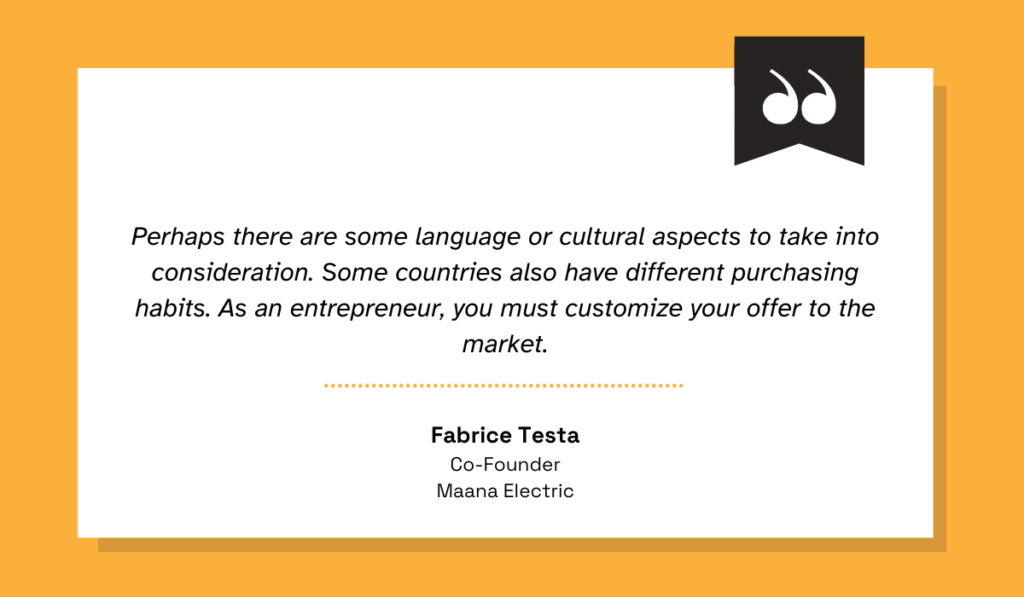
Illustration: Veridion / Quote: Forbes
With AI, you can definitely customize your offer.
It delivers city-level or even zip code-level insights, covering consumer behavior, income distribution, competitor presence, and local trends.
That means smarter decisions, more relevance, and highly targeted strategies.
AI automates data gathering, cleansing, categorization, and reporting—tasks that would otherwise consume countless analyst hours.
This frees human analysts to focus on strategic thinking and interpretation rather than manual data wrangling, ultimately improving productivity and reducing time-to-insight.
Chris Sparenberg, Managing Director, Head of iLEVEL at S&P Global, a provider of market intelligence, agrees:
“[AI] not only drives efficiencies within the specific systems that are being automated, but clearly frees up people from manual tasks so they can offer greater value elsewhere – essentially allowing their time to be used much better.”
Traditionally, so much analysis time is lost to sifting through data by hand, Sparenberg says.
Automate that, and suddenly what used to take hours takes minutes.
It changes the game completely, across all departments.
Say you work in procurement and you need to find a new supplier for a product or a service.
As you might imagine, manually gathering all relevant info and comparing potential candidates would be incredibly time-consuming, especially if you’re looking for partners in distant countries.
But with AI-powered market intelligence?
The process can be over 90% faster, according to the 2021 McKinsey report.
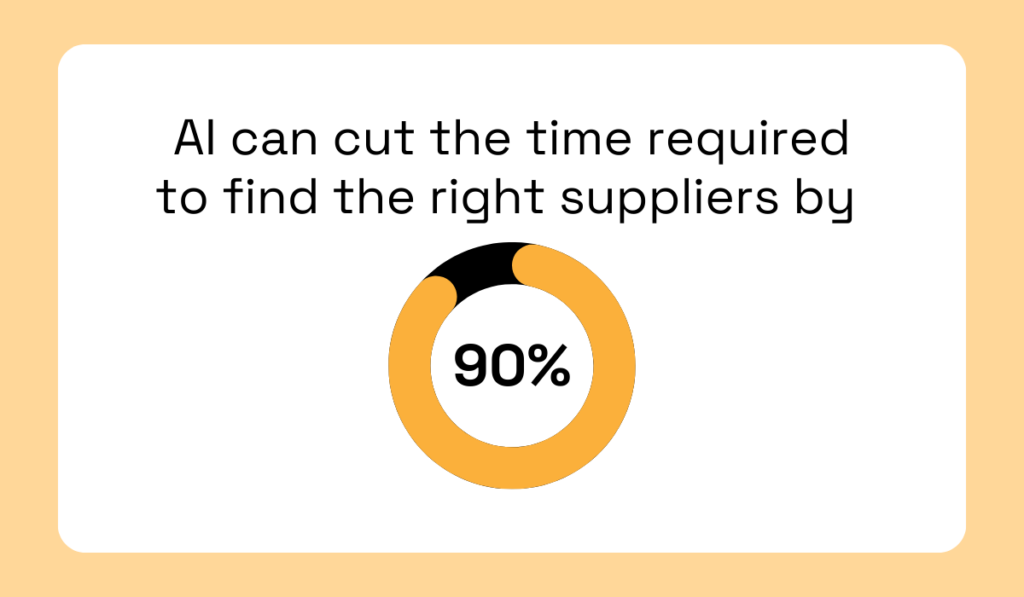
Illustration: Veridion / Data: McKinsey & Company
You just set your criteria, and the AI platform does the rest, scanning millions of potential suppliers worldwide.
It pulls in ESG scores, financial risk data, compliance checks, product details, and more.
All the information you need to make the best choice—delivered instantly.
Now imagine this level of efficiency across the entire business: lightning-fast insights, decisions made with confidence, and almost no time wasted on repetitive, low-value work.
With AI, this is well within your reach.
If you thought it couldn’t get any better, AI-driven market intelligence also helps you look into the future.
It can forecast future market conditions, customer needs, and competitor actions using techniques like time-series forecasting, regression models, and behavioral analytics.
This enables you to be more proactive with your business strategies, which is a huge advantage in today’s highly competitive market.
Todd Johnson, Former Principal at Oracle, puts it this way:
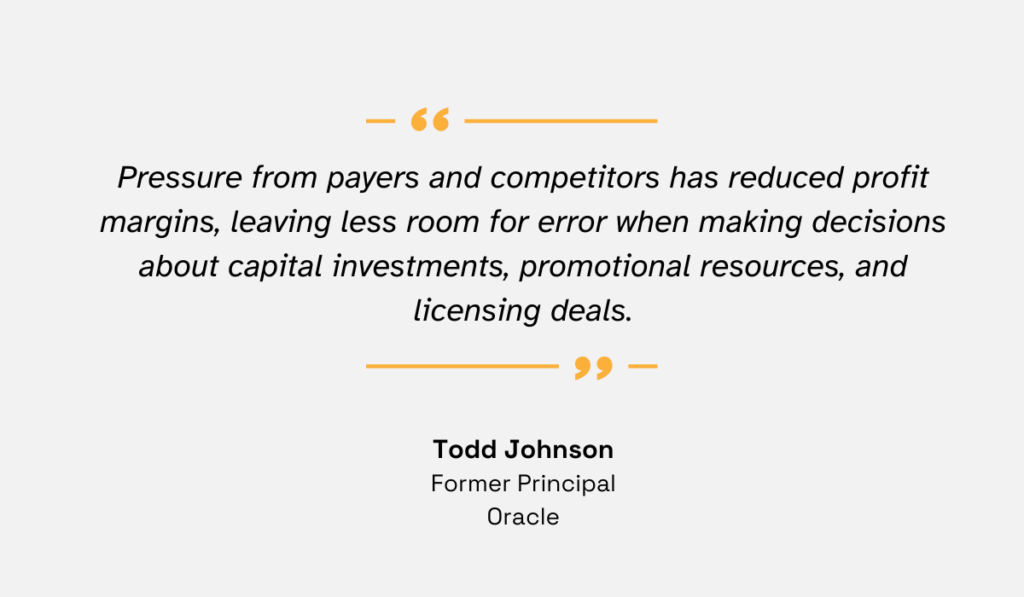
Illustration: Veridion / Quote: PharmaVoice
While he’s speaking about the pharmaceutical industry here, the same applies across sectors.
The market is full of risks, and to navigate those risks, you need the ability to anticipate change.
At PepsiCo, they know this very well.
That’s why they partnered with a platform leveraging machine learning to predict and respond to emerging trends.
Tim Warner, Vice President of Insights & Analytics at PepsiCo, explains why this matters so much:
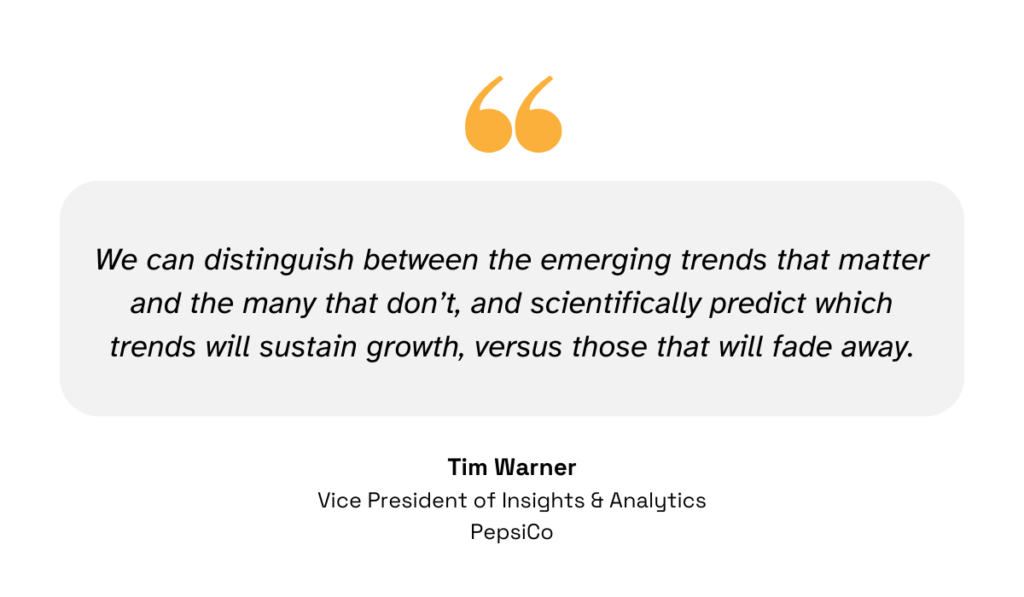
Illustration: Veridion / Quote: Black Swan Data
For instance, in 2018, PepsiCo applied these predictive insights to develop new Sensations crisp flavors.
The platform analyzed social and historical data to spot trending ingredients and forecast which would scale over the next 6–12 months.
This ultimately saved PepsiCo significant time and money on product development.
Stephan Gans, Chief Consumer Insights and Analytics Officer at PepsiCo, praised the technology:
“In a fast-changing world, we’re always looking for better ways to anticipate and act on where the consumer is headed. [Predictive market intelligence] has the potential to redefine how we identify emerging consumer needs and accelerate better products to market.”
Overall, being able to anticipate market conditions, trends, and dynamics is a significant advantage.
It reduces risk, accelerates innovation, and delivers a level of competitive edge that was unimaginable just a few years ago.
Natural language processing, sentiment analysis, and behavioral modeling enable AI to analyze feedback and interactions across channels to uncover what consumers really think, feel, and want.
Yes, AI doesn’t just deal with numbers.
It can also interpret open-ended responses at scale, extracting meaning, emotion, and trends that would be nearly impossible to quantify manually.
This helps you understand the why behind consumer choices, allowing you to tailor products, messaging, and customer experiences more effectively.
Why does this matter?
Because consumers expect it.
The 2022 Accenture survey found that 64% of consumers wish companies would respond faster to their changing needs.
At the same time, 88% of executives admit customers are evolving faster than their business can keep up.
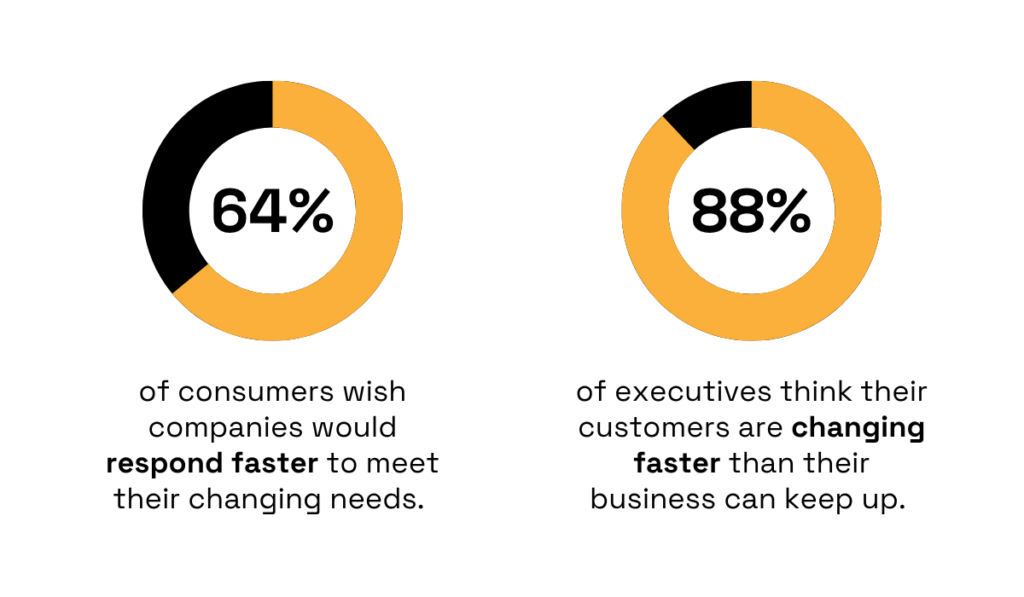
Illustration: Veridion / Data: Accenture
In other words, expectations are rising, but anticipating needs is getting more difficult by the day, creating enormous pressure on brands.
Baiju Shah, Global CEO at AKQA, a design and innovation company, warns:
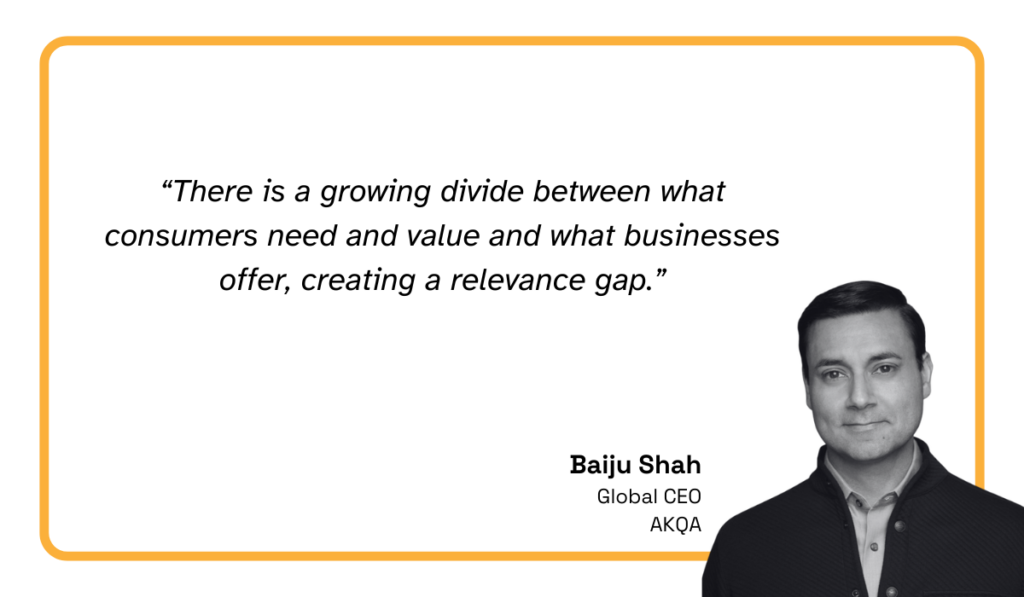
Illustration: Veridion / Quote: Accenture
To close that gap, you need a tool that will help you stay deeply attuned to your customers.
AI-powered market intelligence is that tool.
Just ask Calbee Moh Seng Pte. Ltd, a leading snack company in Singapore.
They wanted to deliver the best experience to their customers, but realized they didn’t know enough about their behavior and brand perception.
So, they partnered with an AI-driven market intelligence platform, which provided insights they never had before, including:
| Brand Perception Analysis | How consumers feel about the brand and the emotional drivers of loyalty and advocacy |
| Competitive & Market Share Intelligence | Competitors’ performance and market share shifts |
| Channel Insights | Info about where consumers are buying (in-store, online, or on-the-go) |
| Purchase Frequency Tracking | How often do consumers reach for snacks, helping to fine-tune promotions and loyalty programs |
With this kind of intelligence, Calbee can adapt faster, make smarter decisions, and keep its products relevant.
Here’s what they said:
“Partnering with [market intelligence platform] has enabled Calbee Moh Seng Pte Ltd with the ability to better understand consumer behavior and brand perception, allowing us to make more informed business decisions to drive the company forward.”
The bottom line?
Relying on simple demographics, assumptions, and guesswork won’t cut it anymore.
Consumers expect brands to really get them: what they value, what they believe in, and why they buy (or don’t).
AI finally makes that possible—at scale, in real time.
Despite the advanced insights AI provides, it still makes everything highly accessible and easy to share across teams.
That’s because AI-driven platforms turn complex market data into intuitive dashboards, as shown in the example below.
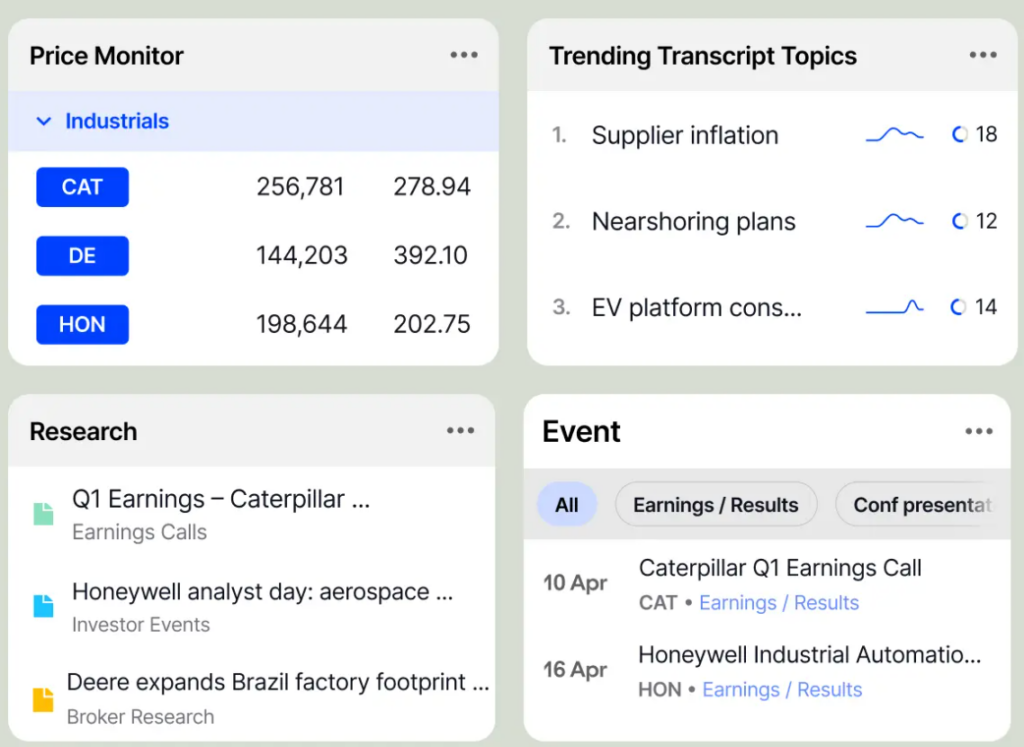
Source: AlphaSense
Here, teams can view executive summaries, trend analyses, role-specific recommendations, and more, all in a single, easy-to-navigate place.
Plus, many platforms now include natural language capabilities, so you can interact with them just like you would with a colleague.
Need something specific?
Simply type your question in plain language, and the system delivers results instantly.

Source: Veridion
No jargon, no coding, no waiting.
Ultimately, this kind of accessibility removes barriers for non-technical employees.
Anyone, from sales and product teams to the C-suite, can access and act on data without needing advanced analytical skills.
Now, here are some concerning insights from the 2023 AlphaSense survey.
Apparently, 95% of companies say they have no ability to easily share market insights across teams.
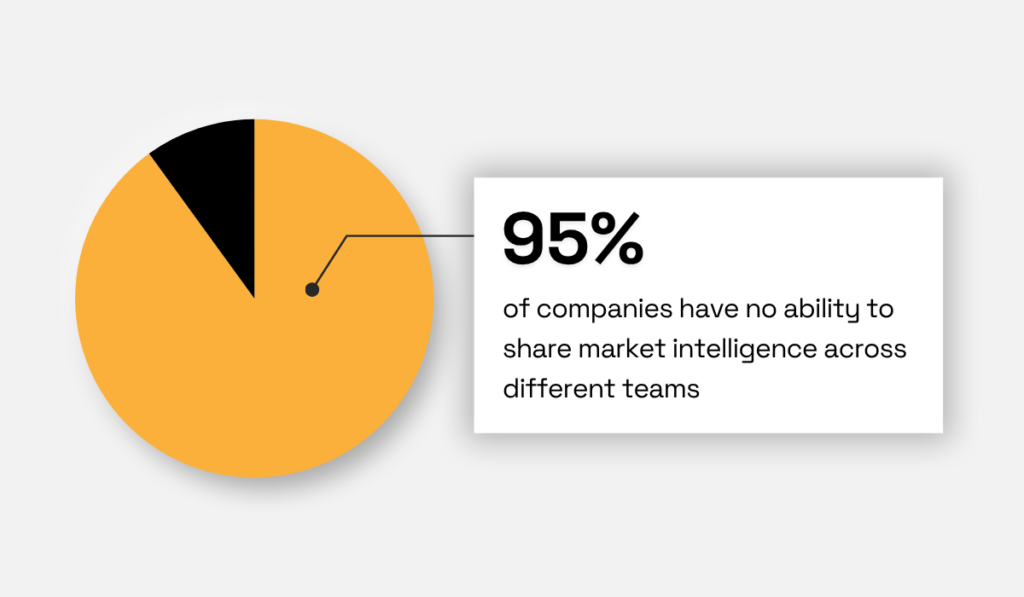
Illustration: Veridion / Data: AlphaSense
This is a big problem.
When insights stay siloed within data or strategy teams, organizations move more slowly, waste time on noise and inefficiencies, and risk missing market opportunities.
That’s why AI-powered market intelligence platforms are such a game-changer.
They eliminate data gatekeeping and enable the free flow of critical information across the organization, powering data-driven decision-making everywhere:
Put simply, AI ensures insights are presented in ways that resonate with different business functions and can be acted upon quickly.
This reduces dependency on specialized teams, accelerates decision-making, and improves cross-functional alignment.
After all, high-quality data alone means nothing.
What really matters is whether you can turn it into action.
One thing is certain: AI is transforming market intelligence forever.
How we gather data, how we read it, how we act on it—everything’s changing.
As a result, we get insights that are sharper, fresher, deeper, and broader than we’ve ever imagined.
That said, AI can’t do everything for you.
Making sense of data and turning it into strategy is still a distinctly human advantage.
So, think of AI as a sparring partner. It can surface alternative perspectives, spot patterns, and pose new questions.
Yet, final decisions require human judgment, qualitative nuance, and business acumen to add depth and meaning to AI-driven insights.